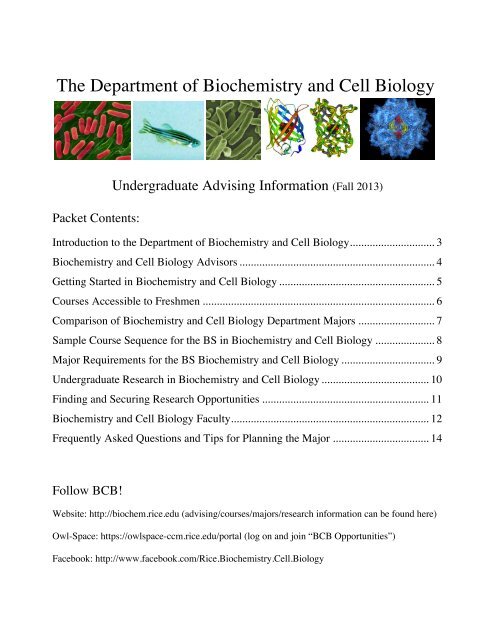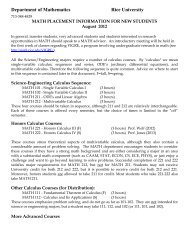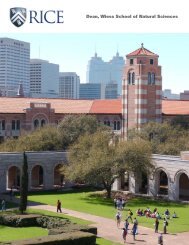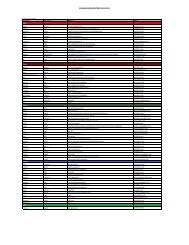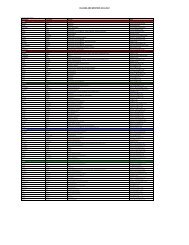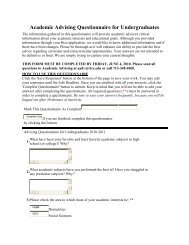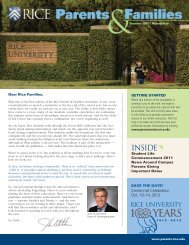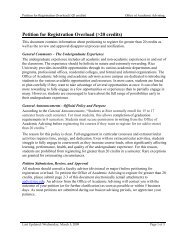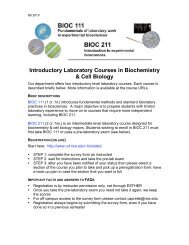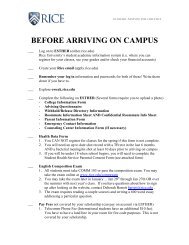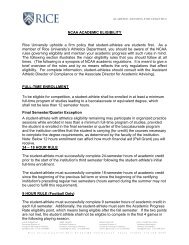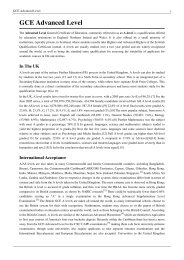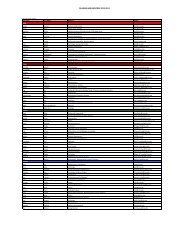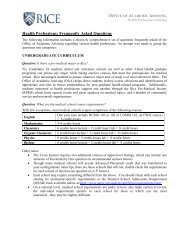Biochemistry & Cell Biology Advising Packet Fall ... - Rice University
Biochemistry & Cell Biology Advising Packet Fall ... - Rice University
Biochemistry & Cell Biology Advising Packet Fall ... - Rice University
You also want an ePaper? Increase the reach of your titles
YUMPU automatically turns print PDFs into web optimized ePapers that Google loves.
The Department of <strong>Biochemistry</strong> and <strong>Cell</strong> <strong>Biology</strong><br />
Undergraduate <strong>Advising</strong> Information (<strong>Fall</strong> 2013)<br />
<strong>Packet</strong> Contents:<br />
Introduction to the Department of <strong>Biochemistry</strong> and <strong>Cell</strong> <strong>Biology</strong> .............................. 3 <br />
<strong>Biochemistry</strong> and <strong>Cell</strong> <strong>Biology</strong> Advisors ..................................................................... 4 <br />
Getting Started in <strong>Biochemistry</strong> and <strong>Cell</strong> <strong>Biology</strong> ....................................................... 5 <br />
Courses Accessible to Freshmen .................................................................................. 6 <br />
Comparison of <strong>Biochemistry</strong> and <strong>Cell</strong> <strong>Biology</strong> Department Majors ........................... 7 <br />
Sample Course Sequence for the BS in <strong>Biochemistry</strong> and <strong>Cell</strong> <strong>Biology</strong> ..................... 8 <br />
Major Requirements for the BS <strong>Biochemistry</strong> and <strong>Cell</strong> <strong>Biology</strong> ................................. 9 <br />
Undergraduate Research in <strong>Biochemistry</strong> and <strong>Cell</strong> <strong>Biology</strong> ...................................... 10 <br />
Finding and Securing Research Opportunities ........................................................... 11 <br />
<strong>Biochemistry</strong> and <strong>Cell</strong> <strong>Biology</strong> Faculty ...................................................................... 12 <br />
Frequently Asked Questions and Tips for Planning the Major .................................. 14 <br />
Follow BCB!<br />
Website: http://biochem.rice.edu (advising/courses/majors/research information can be found here)<br />
Owl-Space: https://owlspace-ccm.rice.edu/portal (log on and join “BCB Opportunities”)<br />
Facebook: http://www.facebook.com/<strong>Rice</strong>.<strong>Biochemistry</strong>.<strong>Cell</strong>.<strong>Biology</strong>
Introduction to the Department of <strong>Biochemistry</strong> and <strong>Cell</strong> <strong>Biology</strong><br />
The Department of <strong>Biochemistry</strong> and <strong>Cell</strong> <strong>Biology</strong> offers a broad range of courses in the biosciences,<br />
including advanced courses in biochemistry, biophysics, cancer biology, cell biology, developmental<br />
biology, endocrinology, genetics, immunology, microbiology, molecular biology, neurobiology, plant<br />
biology, physical chemistry, and virology. Students may choose to pursue a BS or BA in <strong>Biochemistry</strong> and<br />
<strong>Cell</strong> <strong>Biology</strong>, a BA in Biological Sciences, or a Minor in <strong>Biochemistry</strong> and <strong>Cell</strong> <strong>Biology</strong>.<br />
The <strong>Biochemistry</strong> and <strong>Cell</strong> <strong>Biology</strong> BS and BA degree paths are designed for students pursuing a wide<br />
range of careers in the life sciences, typically leading to graduate, medical, or other professional school. Both<br />
paths are designed to emphasize a broad understanding of cell biology and biochemistry, provide room for<br />
exploration anywhere in the Natural Sciences or Engineering, and culminate in one (BA) or two (BS)<br />
required 400-level capstone courses incorporating primary scientific literature, presentations, and writing.<br />
The BA offers greater flexibility with two fewer courses (including a choice of 300-level core courses). The<br />
BS offers greater coverage and depth, with a complete 300-level core and an additional 400-level capstone<br />
course.<br />
Biological Sciences BA is also designed for students pursuing a wide range of careers in the life sciences,<br />
typically leading to graduate or professional school; however, unlike the BCB majors, the Biological<br />
Sciences BA is designed to emphasize a broad understanding of the full range of biological disciplines. The<br />
BA in Biological Sciences may not be combined with any other biosciences degree (i.e., BA <strong>Biochemistry</strong><br />
and <strong>Cell</strong> <strong>Biology</strong>, BA Ecology and Evolutionary <strong>Biology</strong>, BS <strong>Biochemistry</strong> and <strong>Cell</strong> <strong>Biology</strong>, BS Ecology<br />
and Evolutionary <strong>Biology</strong>, Minor in <strong>Biochemistry</strong> and <strong>Cell</strong> <strong>Biology</strong>, or Minor in Ecology and Evolutionary<br />
<strong>Biology</strong>). The Biological Sciences BA is jointly managed by the Department of Ecology and Evolutionary<br />
<strong>Biology</strong> and the Department of <strong>Biochemistry</strong> and <strong>Cell</strong> <strong>Biology</strong>.<br />
Minor in <strong>Biochemistry</strong> and <strong>Cell</strong> <strong>Biology</strong> is intended for those with an interest in the life sciences but who<br />
may be majoring in other areas. This minor incorporates many of the life science core courses required for<br />
the health professions.<br />
3
<strong>Biochemistry</strong> and <strong>Cell</strong> <strong>Biology</strong> Advisors<br />
(advisor photos are in order of their contact listing below)<br />
Advisors for Prospective Students, Freshmen and Undeclared Sophomores<br />
These advisors communicate with incoming students and advise freshmen and sophomores formally and<br />
informally. They are here to assist prospective majors and others such as premedical students who need<br />
specific information about our programs, lecture courses, and laboratory courses.<br />
Dr. Beth Beason Abmayr: 326 Anderson Biological Labs; x2535; bbeason@rice.edu<br />
Dr. Liz Eich: 342 Anderson Biological Labs; x6144; lizmc@rice.edu<br />
Dr. Kathy Matthews: 203 Keck Hall; x4871; ksm@rice.edu<br />
Dr. James McNew: 713 Bioscience Research Collaborative; x3133; mcnew@rice.edu<br />
Dr. Dereth Phillips: 340 Anderson Biological Labs; x2343; derethp@rice.edu<br />
Dr. Alma Novotny: 344 Anderson Biological Labs; x4015; novotnya@rice.edu<br />
Dr. Yousif Shamoo: 332 Keck Hall; x5493: shamoo@rice.edu<br />
Dr. Weiwei Zhong: W200P George R. Brown Hall; x2307; weiwei.zhong@rice.edu<br />
Advisors for Declaring or Declared Majors (advisors are assigned by first letter of your last name)<br />
Dr. Kate Beckingham: W130 GBH; x4016; kate@rice.edu (names beginning with A-H)<br />
Dr. Dave Caprette: 327 Anderson Biological Labs; x3498; caprette@rice.edu (names beginning with I-P)<br />
Dr. Charles Stewart: W104 GBH; x4926, crs@rice.edu (names beginning with Q-Z)<br />
Advisor for Special Issues: Study Abroad or Transfer Credit:<br />
Dr. George Bennett: 813 BRC; x4920; gbennett@rice.edu<br />
BCB Department Coordinator<br />
Monica Roberts (mr19@rice.edu)<br />
4
Getting Started in <strong>Biochemistry</strong> and <strong>Cell</strong> <strong>Biology</strong><br />
Courses to take first<br />
Upper level courses in the BCB major are built on a series of fundamental courses that must be taken as<br />
prerequisites for most advanced courses. For this reason, it is important to take the following courses during<br />
your first year (or transfer in AP credit for them).<br />
• Bioc 201<br />
• Bioc 111*,<br />
• general chemistry and lab (CHEM 121/122/123/124)<br />
If you are a Biological Sciences major you also will need to take:<br />
• Ebio 202<br />
• Ebio 213<br />
See the following information on “Courses Accessible to Freshmen” to view additional courses you can take<br />
your freshman year if you complete or AP out of these.<br />
Undergraduate Research Opportunities<br />
Undergraduate research opportunities in the Department of <strong>Biochemistry</strong> & <strong>Cell</strong> <strong>Biology</strong> are available and<br />
highly encouraged as an important part of a thorough education in the biological sciences. Undergraduates<br />
may begin their research experience even as early as their freshman year by finding and securing a research<br />
position (either on a volunteer basis or for credit through the course, Bioc 310 (www.bioc.rice.edu/bioc310).<br />
Be aware that prospective research advisors often prefer students who can demonstrate competence either<br />
through prior experience or completion of a teaching laboratory course, such as BIOC 111* or BIOC 211*.<br />
BIOC 111 (or equivalent) is a prerequisite for BIOC 310 research.<br />
BCB Opportunities Owl-Space Site<br />
On this “joinable” site we post BCB departmental information and various biology-related opportunities that<br />
we encounter. Examples include: information sessions, research opportunities, summer internship programs,<br />
fellowships, jobs, study abroad, etc. This site and mailing list is a great way to hear about biological and<br />
biomedical research opportunities on and off the <strong>Rice</strong> campus. To join, log on to your Owl-Space account<br />
and go to “My Workspace”-> “Membership” -> “Joinable Sites” and select BCB Opportunities. Note: this<br />
site is not just for research information but also serves as a general source for BCB major information as<br />
well.<br />
*Please see instructions for Bioc 111/211 registration and placement exam at the following site:<br />
(http://www.clear.rice.edu/bioc111/).<br />
5
Courses Accessible to Freshmen<br />
BIOC 111 Fundamentals of Experimental <strong>Biology</strong> (offered <strong>Fall</strong> and Spring, 1 credit hour)<br />
Introduction to basic laboratory skills, including pipetting, solutions, dilutions, spectrophotometry, aseptic technique,<br />
record keeping, and similar basic laboratory activities. Work will consist of short investigative projects. This course is<br />
recommended for students with very limited practical laboratory experience. Students wishing to take BIOC 211 must<br />
take this course or test out of it. www.clear.rice.edu/bioc111/<br />
BIOC 115 Freshman Seminar in Local <strong>Biology</strong> Research (offered <strong>Fall</strong> and Spring, 1 credit hour)<br />
A 7-week seminar course to introduce freshmen prospective biologists to the excitement of research at <strong>Rice</strong> and the<br />
Medical Center. Small groups will meet weekly with a researcher to explore a published research article by a local lab,<br />
meet researchers, and tour labs at <strong>Rice</strong> and the Medical Center. All first-year non-transfer students are eligible to enroll<br />
in BIOC 115/FSEM 115 regardless of AP credit. Meets in the second half of each semester.<br />
www.bioc.rice.edu/bioc115/<br />
FWIS 121: The Body Against Itself: Autoimmune Disease and Diagnosis (<strong>Fall</strong> only, 3 credit hours)<br />
Autoimmune diseases are chronic, incurable illnesses in which the immune defenses of the body destroy its own tissues.<br />
This course explores the medical and social ramifications of these illnesses and introduces students to clinical diagnosis<br />
through the assessment, presentation, and interpretation of specific diagnostic data. FWIS 121 is designed to help<br />
students develop clear critical writing in the context of both matters of opinion and matters of scientific fact.<br />
FWIS 160: Demystifying Bioscience for the Public (Spring only, 3 credit hours)<br />
Scientists make discoveries that change our world, but those leaps forward can also generate fear and misunderstanding<br />
among the general public. Improving communication between scientists and the lay public will help remove the air of<br />
mystery from laboratory research. To those ends, we will teach students to be scientific translators, taking information<br />
from scientists and presenting it in lay terms.<br />
BIOC 122 Fundamental Concepts in <strong>Biology</strong> (offered <strong>Fall</strong> and Spring, 3 credit hours)<br />
For non-majors. An introduction to the nature of science, living organisms, biomolecules, cells, tissues, systems,<br />
evolution and possible origin of life on earth, and genetics, followed by topics of current interest presented by local<br />
researchers. Students will develop critical thinking skills that are needed to assess the social/political/economic impact<br />
of past and current research, research applications, and scientific theories.<br />
BIOC 201 Introductory <strong>Biology</strong> (<strong>Fall</strong> and Spring, 3 credit hours)<br />
Chemistry and energetics, cell physiology, cell biology, Mendelian genetics, molecular genetics, developmental<br />
biology, and plant physiology.<br />
BIOC 211 Intermediate Experimental Biosciences (offered <strong>Fall</strong> and Spring, 2 credit hours)<br />
Introduction to scientific method, principles of experimental design, selected research strategies, record keeping, and<br />
technical communication as related to biological science. Eligible freshmen are encouraged to enroll in Spring semester.<br />
Prerequisites: BIOC 201 and BIOC 111 (or passed pre-lab exam http:// www.clear.rice.edu/bioc111/)<br />
BIOC 300 Paradigms in <strong>Biochemistry</strong> and Molecular <strong>Biology</strong> (Spring only, 3 credit hours)<br />
Designed for BIOC majors and minors and recommended strongly for students with Advanced Placement in <strong>Biology</strong><br />
and students wanting additional foundation before transitioning to the other 300-level BIOC courses. BIOC 300 will<br />
examine paradigms in <strong>Biochemistry</strong> and <strong>Cell</strong> <strong>Biology</strong> with a specific focus on the “central dogma” of molecular<br />
biology. The course will utilize as a text the first eight chapters in The Molecular <strong>Biology</strong> of the <strong>Cell</strong> (Alberts), the<br />
balance of which will be covered in BIOC 341. In addition, this course will examine both historic and contemporary<br />
research papers. Using a newly designed “flipped” format, lectures will be available on-line, and in-class activities will<br />
address confusions/questions, examine research articles, explore cases and problems, and engage students in short<br />
writing assignments. These activities are designed to deepen understanding of the topics.<br />
BIOC 335 <strong>Cell</strong>ular and Molecular Animal Physiology (Spring only, 3 credit hours)<br />
This course will investigate animal physiology from a cellular and molecular perspective using a<br />
comparative approach. Students will explore the physiological concepts underlying aerobic and anaerobic<br />
metabolism, thermoregulation, osmoregulation, kidney function, and other mechanisms involved in<br />
maintaining homeostasis. Prerequisite: BIOC 201<br />
6
Comparison of <strong>Biochemistry</strong> and <strong>Cell</strong> <strong>Biology</strong> Department Majors<br />
Category BA BCB BS BCB BCB-minor BA Biol Sci<br />
Math/Stat<br />
Physics<br />
Intro Chem<br />
Orgo Chem<br />
Intro Bio<br />
Labs<br />
MATH 101*/102 MATH 101*/102 MATH 101*/102 MATH 101*/102<br />
MATH 211 MATH 211<br />
MATH 211, STAT 305<br />
or EBIO 338<br />
PHYS 125/126<br />
or PHYS 101/102<br />
or PHYS 111/112<br />
CHEM<br />
121*/122*/123*/124*<br />
CHEM<br />
211*/212*/215<br />
PHYS 125/126<br />
or PHYS 101/102<br />
or PHYS 111/112<br />
CHEM<br />
121*/122*/123*/124*<br />
CHEM<br />
211*/212*/215<br />
PHYS 125/126<br />
or PHYS 101/102<br />
or PHYS 111/112<br />
CHEM<br />
121*/122*/123*/124*<br />
CHEM<br />
211*/212*/215<br />
PHYS 125/126<br />
or PHYS 101/102<br />
or PHYS 111/112<br />
CHEM<br />
121*/122*/123*/124*<br />
CHEM<br />
211*/212*/215<br />
BIOC 201 BIOC 201 BIOC 201 BIOC 201<br />
EBIO 202<br />
BIOC 211 (prereq.<br />
BIOC 111 or test out)<br />
BIOC 211 (prereq.<br />
BIOC 111 or test out )<br />
Adv Labs BIOC 311 BIOC 311<br />
2 BIOC labs >300 2 BIOC labs >300<br />
level*<br />
level*<br />
BIOC 211 (prereq.<br />
BIOC 111 or test out)<br />
BIOC 211 (prereq.<br />
BIOC 111 or test out )<br />
EBIO 213<br />
3 Adv labs<br />
(EBIO or BIOC)*<br />
BCB Lec BIOC 301 BIOC 301 BIOC 301 BIOC 301<br />
BIOC 302<br />
1 of these 4:<br />
2 of these 3:<br />
BIOC 344<br />
BIOC 302, 341, 344, or<br />
BIOC 302, 344, 352*<br />
BIOC 352*<br />
352<br />
BIOC 341 BIOC 341 BIOC 341<br />
EEB Lec<br />
Bios Lec<br />
Nat Sci Lec<br />
2 Nat Sci/Eng >300**<br />
(>3cr hrs ea.)<br />
2 Nat Sci/Eng >300**<br />
(>3 cr hrs ea.)<br />
1 BIOC >300 level<br />
(>3cr hrs)<br />
1 BIOC >300 level**<br />
(>3cr hrs)<br />
3 EBIO >300 level**<br />
(>3cr hrs ea.)<br />
1 BIOC or EBIO >300<br />
level **<br />
(>3cr hrs)<br />
SR Capstone<br />
1 BIOC 400 level*<br />
(>3cr hrs)<br />
2 BIOC 400 level*<br />
(>3 cr hrs ea.)<br />
* Acceptable substitutions:<br />
Ø MATH 111 and 112 (combined) may be substituted for MATH 101<br />
Ø CHEM 151, 152, 153, and 154 may be substituted for CHEM 121, 122, 123, and 124<br />
Ø CHEM 251 and 252 may be substituted for CHEM 211 and 212<br />
Ø CHEM 310 or CHEM 311 and 312 may be substituted for BIOC 352<br />
Ø If taken for 3 or more credits, BIOC 310, BIOC 401/402/412 or HONS 470/471 may substitute for one 300-level lab (not<br />
BIOC 311) toward the BA and BS in BCB. This substitution may be used only once regardless of the number of semesters<br />
of BIOC 310, 401. 402, 412 or HONS 470/471 taken.<br />
Ø BIOC 310 or EBIO 306 (if taken for 2 or more credits), HONS 470/471, BIOC 412, or BIOC 393 may substitute for an<br />
advanced lab toward the BA in Biological Sciences.<br />
Ø BIOC 401/402/412 counts as a single 400-level course in the BCB BA and BS<br />
Ø Other substitutions may be permissible. Please consult the GA or your major advisor for details<br />
** Must be a lecture course, not an independent research course<br />
This document was created to simplify, but not supersede, information found in the General Announcements. In the event of<br />
discrepancies, the General Announcements are to be considered the final authority on the requirements of the various majors offered<br />
by the Department of <strong>Biochemistry</strong> and <strong>Cell</strong> <strong>Biology</strong>.<br />
7
Sample Course Sequence for the BS in <strong>Biochemistry</strong> and <strong>Cell</strong> <strong>Biology</strong><br />
This is one example of many possible schedules. Major requirements are in BOLD. Consult a Divisional or<br />
<strong>Biochemistry</strong> and <strong>Cell</strong> <strong>Biology</strong> Major advisor to customize your degree plan. This sample assumes no AP credit.<br />
FALL<br />
SPRING<br />
FRESHMAN 15 16<br />
BIOC 201 – Introductory <strong>Biology</strong> I 3 BIOC 211 – Exp. Biosci. Lab (1 st half sem) 2<br />
CHEM 121 – General Chemistry I<br />
and CHEM 123 lab<br />
3<br />
1<br />
CHEM 122 – General Chemistry II<br />
and CHEM 124 lab<br />
3<br />
1<br />
MATH 101 – Single Var. Calculus I 3 MATH 102 – Single Var. Calculus II 3<br />
BIOC 111 – Lab Fundamentals (or pass out) 1 OPEN – Open elective (BIOC 300**) 3<br />
BIOC/FSEM 115 — (optional, 2 nd half sem) 1 DIST – Distribution course 3<br />
FWIS/DIST – FWIS/Distribution course 3 LPAP – Lifetime Phys Activity elective 1<br />
SOPHOMORE 16 18<br />
BIOC 341 – <strong>Cell</strong> <strong>Biology</strong> 3 BIOC 344 – Genetics 3<br />
PHYS 125 – General Physics I 4 PHYS 126 – General Physics II 4<br />
CHEM 211 – Organic Chemistry I 3 CHEM 212 – Organic Chemistry II 3<br />
MATH 211 – Diff. Eq. 3 and CHEM 215 – Organic Lab 2<br />
DIST – Distribution course 3 DIST – Distribution course 3<br />
DIST – Distribution course 3<br />
JUNIOR 17 18<br />
BIOC 301 – <strong>Biochemistry</strong> I 3 BIOC 302 – <strong>Biochemistry</strong> II 3<br />
NATSCI/ENG 300+ elective 3 NATSCI/ENG 300+ elective 3<br />
BIOC 311 – Advanced Exp. Biosciences 2 BIOC 310 – Independent research (OPEN) 3<br />
BIOC 310 – Independent research (adv lab*) 3 DIST – Distribution course 3<br />
DIST – Distribution course 3 OPEN—Open elective 3<br />
OPEN – Open elective 3 OPEN – Open elective 3<br />
SENIOR 16 15<br />
BIOC 400-level elective*** 3 BIOC 400-level elective 3<br />
BIOC 300+ level lab* 1 BIOC 352 – Physical Chemistry for Biosci. 3<br />
BIOC 310 Independent Research (OPEN) 3 BIOC 310 – Independent Research (OPEN) 3<br />
DIST – Distribution course 3 OPEN – Open elective 3<br />
OPEN – Open elective 3 OPEN – Open elective 3<br />
OPEN – Open elective 3<br />
Credit totals in this sample: Major requirements (71 hours), Outside of major (60 hours) = 131 total hours<br />
*Two advanced labs are needed. Independent research (BIOC 310, BIOC 401/402/412, HONS 470/471) can substitute<br />
for one of the advanced labs. This lab substitution can only be used only once in your <strong>Rice</strong> career.<br />
**This course is recommended for students who have AP credit for BIOC 201 and those wanting additional foundation<br />
before taking the other 300-level BIOC courses. BIOC 300 will fulfill a NATSCI/ENG 300+ elective if taken before<br />
other 300-level BIOC courses.<br />
***400-level courses have limited enrollment and spring sections fill quickly. Students are advised to take at<br />
least one in the fall to make sure that they are able to complete this requirement before graduation.<br />
General Notes:<br />
• Difference between BA and BS: The BA in <strong>Biochemistry</strong> and <strong>Cell</strong> <strong>Biology</strong> requires one fewer 400-level elective<br />
than BS and requires only two of the following courses: BIOC 302, BIOC 344, BIOC 352.<br />
• Offered both <strong>Fall</strong> and Spring: BIOC 111, BIOC 115, BIOC 211, BIOC 310, BIOC 311. Other courses may offer<br />
sections both semesters. Check the schedule each year to verify.<br />
• Common prerequisites for BIOC 300/400-level lecture and lab electives (take these early): BIOC 111, BIOC<br />
211, BIOC 201, CHEM 211, BIOC 301, BIOC 341, and BIOC 344<br />
See the General Announcements (http://ga.rice.edu/) or the BCB Department web site for more details and for a<br />
listing of current courses.<br />
8
Major Requirements for the BS <strong>Biochemistry</strong> and <strong>Cell</strong> <strong>Biology</strong><br />
NUMBER CREDIT TITLE<br />
MATH 101 or 111/112 3-6 Single Variable Calculus I<br />
MATH 102 3 Single Variable Calculus II<br />
MATH 211 3 Ordinary Differential Equations and Linear Algebra<br />
PHYS 125, 101, or 111 3-4 General Physics I or Mechanics (with lab)<br />
PHYS 126, 102, or 112 4 General Physics II or Electricity & Magnetism (with lab)<br />
CHEM 121 or 151 3 General/Honors Chemistry I<br />
CHEM 122 or 152 3 General/Honors Chemistry II<br />
CHEM 123 or 153 1 General/Honors Chemistry Lab I<br />
CHEM 124 or 154 1 General/Honors Chemistry Lab II<br />
CHEM 211 or 251 3 Organic Chemistry I<br />
CHEM 212 or 252 3 Organic Chemistry II<br />
CHEM 215 2 Organic Chemistry Lab<br />
BIOC 111 (or test out) 1 Fundamentals of Experimental <strong>Biology</strong><br />
BIOC 201 3 Introductory <strong>Biology</strong><br />
BIOC 211 2 Intermediate Experimental Biosciences<br />
BIOC 301 3 <strong>Biochemistry</strong> I<br />
BIOC 302* 3 <strong>Biochemistry</strong> II<br />
BIOC 311 2 Advanced Experimental Biosciences lab<br />
BIOC 341 3 <strong>Cell</strong> <strong>Biology</strong><br />
BIOC 344* 3 Molecular <strong>Biology</strong> and Genetics<br />
BIOC 352* 3 Physical Chemistry for the Biosciences<br />
BIOC lab elective 1 1-4 300+level lab from approved list<br />
BIOC lab elective 2 1-4 300+level lab from approved list<br />
NSCI/ENG 300+ 3 Any 300+level Science/Engineering course<br />
NSCI/ENG 300+ 3 Any 300+level Science/Engineering course<br />
BIOC 4xx 3 400-level BIOC Capstone<br />
BIOC 4xx* 3 400-level BIOC Capstone<br />
*The BA in <strong>Biochemistry</strong> and <strong>Cell</strong> <strong>Biology</strong> requires one fewer 400-level elective and requires only two of the following<br />
courses: BIOC 302, BIOC 344, BIOC 352<br />
Some general graduation requirements for all <strong>Rice</strong> students<br />
• Complete at least 60 hours of coursework outside of the major<br />
• Complete at least 120 semester hours (BCB majors typically complete more than 120 hours)<br />
• Complete at least 48 hours of all degree work in upper-level courses (at the 300 level or higher)<br />
• Complete all <strong>Rice</strong> courses satisfying degree requirements with a cumulative grade point average of at<br />
least 1.67 or higher<br />
• Complete all <strong>Rice</strong> courses that satisfy major and/or minor requirements (as designated by the<br />
department) with a cumulative grade point average of at least 2.00 or higher.<br />
• Satisfy the Writing and Communication requirement<br />
• Complete one Lifetime Physical Activity Program (LPAP) course for one credit. Students with<br />
disabilities may make special arrangements to satisfy this requirement.<br />
• Complete courses to satisfy the distribution requirements (12 credits D1 and 12 credits D2 (D3 covered<br />
in BCB major))<br />
9
Undergraduate Research in <strong>Biochemistry</strong> and <strong>Cell</strong> <strong>Biology</strong><br />
Undergraduate research is an important component of BCB program, and, while not required for the major,<br />
undergraduate research can enhance the undergraduate experience and provide opportunities for career<br />
development. The undergraduate research program in <strong>Biochemistry</strong> and cell biology has been designed to<br />
flow from observation through participation. Students are encouraged to seek our undergraduate research<br />
opportunities whenever they are ready. A freshman seminar (Bioc 115) and a lab fundamentals course (Bioc<br />
111) are designed to provide students with the exposure and basic skills to navigate early entry into labs. The<br />
following courses offer opportunities to experience and participate in active research programs at <strong>Rice</strong> and in<br />
the Texas Medical Center.<br />
BIOC 115: Freshman Seminar in Local <strong>Biology</strong> Research<br />
This mini seminar is most easily summarized as "read the paper, tour the lab." Students read two primary<br />
research articles guided by written homework and class discussion. The featured article for each section is<br />
from a <strong>Rice</strong> lab and the course culminates in a reception and tour of the featured lab (featured labs differ for<br />
each section). Four additional activities and tours include a scientific seminar, a tour of the instructor’s lab, a<br />
tour of a medical center department, and a science-related movie screening. The course takes place during<br />
the 2 nd half of each semester. Enrolment is only open to first-year college students (not transfers).<br />
www.bioc.rice.edu/bios115/<br />
BIOC 310: Independent Research in <strong>Biochemistry</strong> and <strong>Cell</strong> <strong>Biology</strong><br />
This is a research-for-credit course in which students perform research in faculty labs in the <strong>Rice</strong> <strong>University</strong><br />
Department of <strong>Biochemistry</strong> and <strong>Cell</strong> <strong>Biology</strong> and elsewhere in the Texas Medical Center, prepare a research<br />
proposal, weekly reports and a research paper (<strong>Fall</strong>) or poster (Spring), and receive course credit for their<br />
effort. Students may perform research in the <strong>Biochemistry</strong> and <strong>Cell</strong> <strong>Biology</strong> Department or off-campus in the<br />
Texas Medical Center (TMC). Those intending to participate in BCB undergraduate research should take the<br />
prelab exam ASAP so that they can begin the BCB lab sequence (http://www.clear.rice.edu/bioc111/).<br />
Prerequisites are BIOC 111 or BIOC 211. Please read the Bioc 310 manual for complete course information<br />
and requirements. (www.bioc.rice.edu/bioc310/)Note: Students wishing to perform their Bioc 310 research off<br />
campus must submit an application to the Bioc 310 instructor, Dr. Dereth Phillips (derethp@rice.edu), at least 2 weeks<br />
before the start of the semester for permission to enroll. The Bioc 310 off-campus may be obtained from the Bioc 310<br />
website. Students working off campus may not take Bioc 310 for fewer than 3 credit hours (9 hours of research/week).<br />
BIOC 401/402/412: Honors Research in <strong>Biochemistry</strong> and <strong>Cell</strong> <strong>Biology</strong><br />
The <strong>Biochemistry</strong> and <strong>Cell</strong> <strong>Biology</strong> Honors Research Program is a suite of courses offering our seniors and<br />
advanced juniors the opportunity to perform a two-semester, individual research project in a research<br />
laboratory in <strong>Biochemistry</strong> & <strong>Cell</strong> <strong>Biology</strong> or elsewhere in the TMC. This immersive program is intended to<br />
give a first-hand experience of what a career in research would entail. Students interested in graduate school<br />
are strongly encouraged to apply for consideration for honors research. Information and application at:<br />
http://biochem.rice.edu/Content.aspx?id=191<br />
BCB-Opportunities Owl-Space site<br />
On this “joinable” site we post various biology-related opportunities that we encounter. Examples include:<br />
research opportunities, summer internship programs, fellowships, jobs, study abroad, etc. This site and<br />
mailing list is a great way to hear about biological and biomedical research opportunities on and off the <strong>Rice</strong><br />
campus. To join, log on to your Owl-Space account and go to “My Workspace”-> “Membership” -><br />
“Joinable Sites” and select BCB Opportunities.<br />
10
Finding and Securing Research Opportunities<br />
Think about the sorts of research that may be of interest to you and talk to students and advisors in that<br />
area of research. Explore on your own by searching through different research departments at <strong>Rice</strong> or in the<br />
Texas Medical Center. You can learn about the research in a particular department by going to the “Faculty”<br />
or “People” tab and clicking through the various faculty names and research statements. At the same time,<br />
join the BCB Opportunities Owl-Space site to receive information about research opportunities at <strong>Rice</strong> and<br />
elsewhere. (Log on to Owl-Space and select the following: “My Workspace”-> “Membership” -> “Joinable<br />
Sites” and select BCB Opportunities). When you have found a lab(s) of interest, scan through recent<br />
research articles from that lab and contact the professor to express your interest. (Before contacting the<br />
professor, it may be helpful to read the Bioc 310 course manual to get a feel for the expectations of an<br />
undergraduate researcher. www.bioc.rice.edu/bioc310/). Determine the nature of your internship<br />
(volunteer, for pay, for credit, for one semester/summer, for multiple years). If you are interested in receiving<br />
credit for your research, contact the instructor of the research-for-credit/independent study course in the<br />
appropriate department. Links to the BCB department and to various off-campus departments may be found<br />
on the off-campus portion of the Bioc 310 website.<br />
Independent research in the Department of <strong>Biochemistry</strong> and <strong>Cell</strong> <strong>Biology</strong> and beyond.<br />
Once you have found a research position, you may be eligible to receive course credit in an appropriate<br />
department. All of the following courses may be taken by permission only. Please contact the course<br />
instructors for additional details and requirements.<br />
BIOC 310—<strong>Biochemistry</strong> and <strong>Cell</strong> <strong>Biology</strong><br />
EBIO 306—Ecology and Evolutionary <strong>Biology</strong><br />
BIOE 400/401—Bioengineering<br />
CHBE 500—Chemical and Biomolecular Engineering<br />
NEUR 485—Neuroscience<br />
CHEM 491—Chemistry<br />
KINE/HEAL 495/496 —Kinesiology/Health Sciences<br />
HONS 470/471 (RUSP) —Office of Fellowships and Undergrad. Research, for all majors<br />
UNIV 301—<strong>University</strong>-wide, zero-credit, for all majors, all types of projects qualify<br />
Find the course number/department that best matches your research interests. Most departments, including<br />
those not listed here, have an independent study/research course.<br />
Note for those interested in the health professions: There are many types of research that can improve<br />
human health outside of the biological sciences (health disparities economics, medical sociology, psychology<br />
of addiction, etc.). For the most fulfilling research experience, make sure to pursue the research that most<br />
interests you rather than that which you perceive is desired by med schools.<br />
<strong>Biochemistry</strong> and <strong>Cell</strong> <strong>Biology</strong> undergraduate research contact information:<br />
Dereth Phillips, Ph.D., instructor: Bioc 115 and Bioc 310, master: McMurtry College<br />
office: 340 Anderson Biological Labs, email: derethp@rice.edu<br />
11
<strong>Biochemistry</strong> and <strong>Cell</strong> <strong>Biology</strong> Faculty<br />
BCB Research and Teaching Faculty<br />
Bonnie Bartel<br />
Genetics of peroxisome function and auxin regulation and<br />
responses in Arabidopsis development<br />
Kathleen M. Beckingham<br />
Genes controlling behavior and gravity sensing in<br />
Drosophila; calcium signaling in Drosophila; studies of the<br />
calcium sensor proteins Calmodulin and Androcam and of<br />
and behavior related gene using in vivo molecular genetic<br />
approaches and in vitro biochemical and biophysical<br />
approaches<br />
George N. Bennett<br />
Regulation of stress responses in bacterial systems;<br />
development of DNA tools for genomic studies;<br />
biodegradation by microbes; metabolic engineering and<br />
synthetic biology<br />
Matthew Bennett<br />
Experimental and theoretical molecular systems biology<br />
using both bacteria and yeast as model systems<br />
Janet Braam, Chair<br />
Circadian rhythms in plants; functions of calmodulin-like<br />
proteins and cell wall modifying enzymes; perception, signal<br />
transduction and gene expression regulation in response to<br />
environmental stimuli<br />
Dan Carson, Dean of Natural Sciences<br />
Expression and function of cell surface components<br />
participating in and regulating cellular interactions in<br />
developing embryos and various tumor cell models<br />
Mary C. Farach-Carson<br />
The role of extracellular matrix in the progression of cancer;<br />
the use of proteoglycans in the engineering of connective<br />
tissues<br />
Michael C. Gustin<br />
Molecular genetics, biochemistry, and cell biology of stressactivated<br />
protein kinase pathways and nitric oxide sensing<br />
mechanisms in yeast; development of novel rotavirus vaccine<br />
Peter Lwigale<br />
Molecular regulation of cell migration during eye<br />
development and cornea regeneration<br />
12
Kathleen S. Matthews<br />
Structure and function of genetic regulatory proteins<br />
James McNew<br />
Molecular mechanism of biological membrane fusion;<br />
functional reconstitution of exocytosis; role of SNARE<br />
regulator proteins in membrane fusion; peroxisome<br />
biogenesis and function in Drosophila melanogaster<br />
Edward P. Nikonowicz<br />
NMR spectroscopy of RNA and RNA-protein interactions -<br />
correlation of structure, function, and dynamics; structural<br />
and dynamics studies of phage regulatory elements; structural<br />
studies of rRNA protein recognition sites; isotopic<br />
enrichment structure and thermodynamic studies of basemodified<br />
tRNAs<br />
John S. Olson<br />
Biochemical, biophysical, and physiological properties of<br />
myoglobins, hemoglobins, flavohemoglobins, and red blood<br />
cells; genetic engineering of heme protein based blood<br />
substitutes; enhancement of recombinant hemoglobin<br />
expression in bacteria; application of rapid kinetic techniques<br />
to biological problems<br />
George N. Phillips, Jr.<br />
Relationship of three-dimensional structure and dynamics of<br />
proteins to biological function<br />
Yousif Shamoo<br />
DNA replication and its relationship to cancer; sequence<br />
specific protein-RNA interactions in eukaryotic RNA<br />
processing proteins; in vivo pathways of molecular evolution;<br />
acquisition of thermostability by mesophilic adenylate kinase<br />
in Bacillus stearothermophilus<br />
Jonathan Silberg<br />
Directed evolution, extremophiles, iron-sulfur cluster<br />
biogenesis, and molecular chaperones<br />
Michael Stern<br />
Molecular and genetic control of ion channel activity and<br />
synaptic transmission in the Drosophila nervous system<br />
Charles R. Stewart<br />
Bacteriophage molecular genetics: mechanisms of host<br />
takeover during bacteriophage infection; mechanisms of<br />
bactericidal gene action<br />
BCB Teaching Faculty<br />
Beth Beason-Abmayr<br />
BIOC 111, BIOC 311, 313, 413, and others<br />
Elizabeth Eich<br />
BIOC 211, FWIS 121, and other courses; Communication in<br />
Natural Sciences program,<br />
David R. Caprette (Professor In The Practice)<br />
BIOC 111, 122, 318, 385, 415, and others.<br />
Alma Novotny<br />
BIOC 201, BIOC 372, MLSC 525, and other courses<br />
Dereth Phillips<br />
BIOC 115, 310, BCB Opportunities site, undergraduate<br />
research advisor.<br />
Gabriel Villares<br />
BIOC 201, 211, 341, 460<br />
Joint faculty<br />
Herbert Levine (Bioengineering)<br />
Seiichi P.T. Matsuda (Chemistry, chair)<br />
George McLendon (Provost)<br />
Luay Nakhleh (Computer Science)<br />
José Onuchic (Physics & Astronomy)<br />
Ronald J. Parry (Chemistry)<br />
Laura Segatori (Chemical & Biomolecular Eng.)<br />
Jeffrey J. Tabor (Bioengineering)<br />
Peter Wolynes (Chemistry<br />
For more detailed information about BCB faculty and<br />
their research, visit the BCB website:<br />
http://biochem.rice.edu<br />
Yizhi Jane Tao<br />
Molecular mechanism of viral genome replication and<br />
transcription<br />
Daniel S. Wagner<br />
Vertebrate development, embryonic morphogenesis,<br />
zebrafish genetics<br />
Weiwei Zhong<br />
Genetic interaction networks, high-throughput tools for<br />
genetic screens.<br />
13
8/12/13<br />
Frequently Asked Questions and Tips for Planning the Major<br />
"Is it better to get a BS rather than a BA?" Neither degree is "better" than the other. Graduate<br />
schools and medical schools look at your overall academic record including performance, course loads<br />
taken, research experience, extracurricular activities, etc. You might choose the BA degree because<br />
you want to add a double major, for example, or because you want to spend more time on<br />
undergraduate research rather than on the extra course work required for the BS.<br />
"I want to earn a BS in BCB and double major in history. Can I do it?" Yes, but because a history<br />
major earns a BA degree you would have to meet the requirements for what we call a dual degree. A<br />
dual degree is not the same as a double major. You can major in two or more different fields simply by<br />
meeting the requirements for both majors provided that the degree earned is either a BA or BS but not<br />
both. To earn a dual degree (BA/BS) you must complete the requirements for both majors and<br />
complete at least 30 additional semester hours at <strong>Rice</strong> beyond the hours required for the first degree.<br />
"I will complete all of the requirements for my major but how can I be sure I have my 60 hours<br />
outside the major?" All courses not specifically applied to your major field count as "outside" the<br />
major, even courses taken in the same discipline. For example, if you complete all of the course<br />
requirements listed for a BA in BCB and take a couple of extra BIOC courses, those courses count<br />
toward the additional 60 hours needed.<br />
Tips for planning your BCB major<br />
• First semester freshmen: Take the BCB prelab exam to prequalify for the BCB lab sequence<br />
(http://www.clear.rice.edu/bioc111/). Those without biology AP credit should enroll in Bioc 201,<br />
which is a prerequisite for virtually all other biological sciences courses.<br />
• Use the information in the General Announcements, BCB web site, or a checklist to help plan your<br />
degree.<br />
• Complete all of your lower division course requirements, including all math, chemistry, and<br />
physics, introductory biology, and the introductory biology lab(s) by the end of your sophomore<br />
year.<br />
• At times you will have to take at least two or three difficult courses in the same semester – it<br />
would be wise to take them sooner rather than later.<br />
• Complete some upper division requirements before your junior year to give you more flexibility in<br />
your last two years.<br />
• Save some "room" in spring semester senior year, in case you fall behind.<br />
• Complete your laboratory course work before spring semester senior year in case a course that you<br />
need is full or cancelled.<br />
• BIOC 301 is currently taught only in fall; BIOC 302 and 352 are currently taught only in spring.<br />
Most 400-level courses and some upper-level labs are taught only once per year. Please plan ahead<br />
so that you have the opportunity to take the course or courses that you want.<br />
• BIOC 311 is a prerequisite for some BIOC lab courses and some sections fill up fast. Please do not<br />
wait until your last semester to sign up for this course.<br />
• BIOC 302 and 352 are among the most difficult courses in the program, thus you may want to take<br />
them in different semesters.<br />
• As you plan your last four semesters check that you will complete at least the minimum required<br />
hours (48) at the 300 level or higher.<br />
• If you have had difficulty making good grades in lower division science courses then you may<br />
want to reconsider the BS degree; the upper division course work will be more, not less,<br />
challenging.<br />
• No single course can count for more than one major requirement.<br />
14


